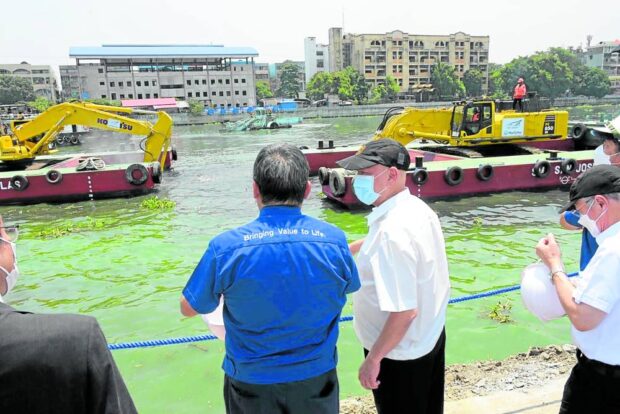
FLOOD MANAGEMENT Ang observes the dredging of Pasig River as part of SMC’s P3-billion river cleanup initiative to address heavy siltation and pollution
..
.
.
Filipino tycoon Ramon S. Ang has joined an elite circle of Asia-Pacific business leaders who are recognized for their acts of charity.
Ang, 69, is the only Filipino among the 15 tycoons who made it to Forbes Asia’s 2023 Heroes of Philanthropy list, which also includes Hong Kong’s richest person, Li Ka-Shing, and Infosys co-founder and chair Nandan Nilekani of India.
Worth an estimated $3.4 billion, Ang is the president and major shareholder of San Miguel Corp., one of the largest companies in the Philippines.
Forbes underlines his recent P500-million pledge to build schools for underprivileged children in Manila.
He announced the donation last September as he inaugurated a 39-classroom school in Tondo, one of the the capital city’s poorest districts where he grew up.
“By providing these families the opportunity to upskill, we hope to ultimately boost their income levels, decrease unemployment, elevate overall living standards and help them realize intergenerational change,” Ang says of this community project.
Since 2020, Ang has personally contributed more than P150 million to scholarship grants and medical aid through his RSA Foundation, Forbes cites.
San Miguel Foundation separately spent more than P1 billion to build five schools in Metro Manila, while donating P14.8 billion to support relief measures during the COVID-19 pandemic and earmarking another P3 billion to help clean up the city’s rivers.
Philippine Stock Exchange president Ramon Monzon underscores the company’s philanthropic programs under Ang’s leadership and praised its COVID-10 response.
“SMC’s COVID-19 response was simple and apt: walang iwanan [no one gets left behind],” Monzon says.
“The 17th century British clergyman and historian Thomas Fuller popularized a phrase ‘charity begins at home.’ SMC is obviously a believer and practitioner of this phrase,” Monzon adds during the listing ceremony of SMC’s preferred shares on Friday.
BENEFACTOR Ang with Manila Mayor Honey Lacuna at the launch of Better World Smokey Mountain Tondo, SMC’s fifth community center.
Noble roster
Forbes magazine’s annual Heroes of Philanthropy recognizes corporate leaders “who are donating from their own fortunes and giving personal time and attention to their select causes.”
“The list does not include corporate philanthropy except for privately held companies where the individual is a majority owner. Previous honorees are considered if they have made recent significant contributions that justify a relisting,” Forbes says.
Li Ka-Shing, the 95-year-old senior adviser at CK Asset Holdings and CK Hutchison Holdings, has donated 60 million Hong Kong dollars to two universities to support the use of artificial intelligence in medical education.
He has donated more than 30 billion Hong Kong dollars since 1980, mainly to education and health-care initiatives.
Nilekani donated $38 million to his alma mater IIT Bombay in June. It was to mark his 50-year association with the technology institute, where he studied electrical engineering.
Also part of the list are: mining tycoons Andrew and Nicola Forrest; Takemitsu Takizaki, the founder of sensor-maker Keyence; He Xiangjian, founder of Shenzhen-listed appliance maker Midea Group; Vikrom Kromadit, founder and chair of Bangkok-listed industrial estate operator Amata Corp.; DLF chair emeritus K.P. Singh; Low Tuck Kwong, founder and president-director of Bayan Resources; Kwek Leng Beng, executive chair of City Developments; Packer Family Foundation founder James Packer; Graeme Hart, owner and director of Rank Group; media mogul Eddy Kusnadi Sariaatmadja; Nikhil Kamath, co-founder and chief financial officer of Zerodha; and Adrian Cheng, executive vice chair and CEO of New World Development.
HOMETOWN AID Ang at the opening of SMC’s largest community center at the former Smokey Mountain dumpsite in Tondo, Manila, in September. On the spot, he announced a P500-million initial donation to build more school facilities in the capital city. —Contributed photos
Vision-mission
As it celebrates its 133rd anniversary this year, SMC has launched its new group vision: “A resilient and globally competitive Philippines where everyone can enrich and enjoy their lives.” It has also unveiled its purpose statement: “To lead in nation-building by creating opportunities that will uplift generations of Filipinos, allowing all to share in the rewards of sustainable development and prosperity.”
Citing its commitment to sustainability, SMC has set four major goals: uplift the lives of at least 15 million Filipinos by 2030; implement a circular economy approach by 2040; achieve ‘net zero’ greenhouse gas emissions by 2050 and establish a fully sustainable and ethically sound supply chain by 2040.